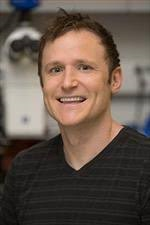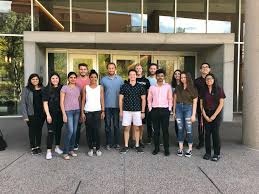Kaehr Young Investigator in Alzheimer Stem Cell Research Award
The Kaehr Young Investigator in Alzheimer Stem Cell Research Award recognizes early-career investigators who show exceptional promise in their independent careers. UC San Diego has a strong neuroscience community and an ability to develop young researchers into productive faculty. With deep intellectual capital and a culture rooted in pioneering approaches to science, technology, and translational medicine, bridging lab with clinic. UC San Diego is an ideal environment for collaboration.

The Kaehr Young Investigator Award has seen enormous success since its inception in 2010. The inaugural prize went to David Brafman, Ph.D., M.B.A., who is currently an Assistant Professor in the School of Biological and Health Systems Engineering at Arizona State University. Dr. Brafman’s research focus is to apply bioengineering approaches to the study of stem cell microenvironments and using these to direct the fate of stem cells to clinically relevant cell types to model and treat a variety of diseases including Alzheimer's disease.

The current Kaehr Young Investigator is UC San Diego Assistant Professor Richard Daneman, Ph.D. His proposal looks to develop a stem cell-based biologic delivery system to produce nanobodies that attack Alzheimer’s targets in the brain. This multi-disciplinary approach is the type of research that has made the research community on the Mesa into a world leader in translational research.
This fund continues to make important contributions to the quality of advanced scientific techniques while inspiring the many patients and students who will benefit from the research. We are deeply grateful for the opportunity to administer the Kaehr Young Investigator in Stem Cell Research Award and look to continue to build on the legacy. This program also serves as a model for targeting a specific disease, while also supporting the vibrant research community around us.
Testimonial by David Brofman, Ph.D., M.B.A
Since 2015, I have been an assistant professor in the School of Biological and Health Systems Engineering at Arizona State University (ASU) and the Director of the ASU Stem Cell Training and Research (STaR) program. Broadly speaking my laboratory uses bioengineering tools in conjunction with human pluripotent stem cell (hPSCs) to model various aspects of neurodevelopment and neurodegenerative disease, with a focus on Alzheimer’s disease. Since 2010, my laboratory has published over 30 peer reviewed manuscripts in high impact journals such as Cell Reports, Nature Communications, Nature Protocols, Nucleic Acids Research, Proceedings of National Academies of Sciences, and Stem Cell Reports. My laboratory has leveraged the initial funding provide by Kaehr Award to secure over $6M in extramural funding from the Arizona Alzheimer’s Disease Consortium, Arizona Biomedical Research Commission, Department of Defense, National Institutes of Health, and Women and Philanthropy. Through this additional funding that was made possible by the Kaehr’s gift, my laboratory has trained over 30 graduate and undergraduate students, many of whom have received prestigious fellowships such as the Fulton Undergraduate Research Initiative Award, J. William Fulbright Fellowship, and the National Science Foundation Graduate Fellowship. I have also been fortunate to be the recipient of numerous awards including the Burnham Family Fellowship, Fulton School of Engineering Outstanding Assistant Professor, and the SBHSE Outstanding Assistant Professor. Moving forward, it is my hope that we can continue to pay forward Nancy and Michael’s initial investment through continuing with impactful research findings, securing extramural funding, and mentoring successful young scientists.

If you are interested in sponsoring this program or starting a similar scholarship fund, please contact stemcells@ucsd.edu